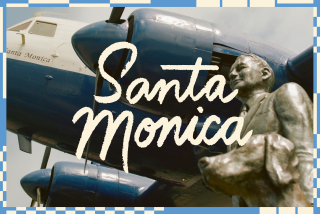Pastoral lifestyle is preserved in Capistrano
- Share via
San Juan Capistrano is a famously picturesque town known for its namesake mission and for the legendary swallows that return to it every year. People, too, flock to this historic city for its pastoral lifestyle and relative lack of pretense. The city of 32,500 is nestled in a coastal valley one mile from the ocean, halfway between Los Angeles and San Diego.
Insider’s view
Slow growth and historic preservation are the mantras in this town, which is one of the oldest in the West. There is community pride to spare and a core of locals that fight valiantly, if not always successfully, against rapid development.
FOR THE RECORD
Capistrano schools -- An article in Sunday’s Real Estate section incorrectly stated that there are two elementary schools in San Juan Capistrano. There are four. The story also said that test scores at San Juan Elementary “dip to the 30th and 40th percentiles.” In fact, math scores at some grade levels are in the 50th percentile.
One of the reasons for the town’s beauty is a city ordinance that forbids building on ridgelines or sightlines. The rolling coastal hills remain unfettered, and no one is king of the hill.
The low-crime, 13.6-square-mile city has a diverse population, including a denizen of cowboys, a large population of Mexican immigrants and white-collar SUV-driving newcomers.
Drawing card
The quaint, old-fashioned town caters to pedestrians, many of whom come in by train at the busy San Juan Depot. Within walking distance of Mission San Juan Capistrano, the town’s centerpiece, are a library designed by Michael Graves, numerous antiques stores, a playhouse, several mom-and-pop restaurants and boutiques.
Just over the tracks by the depot is the Los Rios Historic District, a well-preserved residential street and still-thriving slice of the past. The annual Swallows Day Parade, a tradition that began in the 1930s, pays tribute to the area’s history every March with marching bands and local cowboys on horseback.
Wow factor
Since its founding by Father Junipero Serra in 1776, the mission has been considered the jewel of the 21 missions that were built along El Camino Real. The mission’s idyllic grounds, tolling bells, tranquil gardens and old adobe walls make it popular with tourists and locals.
Dividing lines
The 5 Freeway splits the town into east and west sides. With the exception of exclusive homes in the vicinity of Aguacate and Peppertree Bend, two of the city’s most prestigious streets featuring multimillion dollar estates, the west side is older, offers more affordable single-family homes and the bulk of the city’s multifamily housing.
East of the freeway are newer, upscale homes, many built during the last 15 years. These tonier neighborhoods attract commuters who want relief from more congested nearby cities but who still want easy access to the business corridors of Irvine and Newport Beach. Homes in these neighborhoods, which include Hunt Club, Marbella, Capistrano Estates, Stoneridge and San Juan Hills, range from the high $700,000s to more than $3 million, according to broker Robyn Robinson, co-owner of Regency Real Estate.
Good news, bad news
With a mean daily temperature of 53 degrees in January and 67 degrees in July, it would be hard to find better weather. Traffic congestion, however, particularly around the mission and overpass at Ortega Highway, is an increasing problem.
Hot spots
The Swallows Inn, a popular location for filmmakers, is the closest thing to a saloon most city folk will ever see, except instead of horses hitched out front, Harleys are parked in gleaming rows. Inside, the rowdy riders, sporting full beards and leather-clad girlfriends, drink heartily to live and lively western music.
Report card
Public schools are part of the Capistrano Unified School District. The town’s two elementary schools reflect what one would expect from a city that has two sides of the track. Student test scores at Ambuehl Elementary on the east side average in the 70th and 80th percentiles. At San Juan Elementary, to the west, scores dip to the 30th and 40th percentiles, and into the 20s in reading. These two schools feed into Marco F. Forster, the city’s only middle school. Though the school pulls just above average on national test scores, it has trouble overcoming negative perceptions about its mixed demographics. Some residents send their children to one of the city’s five private schools, or to other private schools just outside the city limits.
On the market
In early December, 89 single-family houses were on the market for between $350,000 and $7 million; 16 condos were listed for prices ranging from $135,000 to $589,000.
Housing stock
San Juan Capistrano has 7,019 single-family residences and 2,048 condominiums. During the last 12 months, 209 condos have sold. During the same period, 498 single-family houses have sold.
Historical values
Single-family detached home prices:
Year...Median Price
1990...$270,250
1995...$190,000
2000...$297,500
2001...$308,000
2002*...$410,000
*year to date
Sources: DataQuick Information Services, Regency Real Estate Brokers and San Juan Capistrano Chamber of Commerce.
More to Read
Sign up for Essential California
The most important California stories and recommendations in your inbox every morning.
You may occasionally receive promotional content from the Los Angeles Times.






